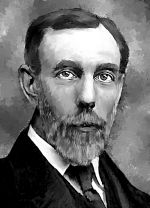William Ramsay KCBE, FRS
J William Ramsay KCBE, FRS
The Nobel Prize in Chemistry 1904
Molecular weights in liquid state. Stoichiometry, thermodynamics. Helium in radium emanations.
“Noblest exercise of mind within doors, and most befitting a person of quality, is study.”
Images
Quotations
Hobbies/Interests
Quotations
1. But I am leaving the regions of fact, which are difficult to penetrate, but which bring in their train rich rewards, and entering the regions of speculation, where many roads lie open, but where a few lead to a definite goal.
2. Progress is made by trial and failure; the failures are generally a hundred times more numerous than the successes; yet they are usually left unchronicled. The reason is that the investigator feels that even though he has failed in achieving an expected result, some other more fortunate experimenter may succeed, and it is unwise to discourage his attempts.
3. The country which is in advance of the rest of the world in chemistry will also be foremost in wealth and in general prosperity.
4. If Russia is prepared to run the risk of cutting off supplies to its neighbors if they have a disagreement, how reliable are they as a supplier? You have to ask the question.
5. Chemistry and physics are experimental sciences; and those who are engaged in attempting to enlarge the boundaries of science by experiment are generally unwilling to publish speculations; for they have learned, by long experience, that it is unsafe to anticipate events. It is true, they must make certain theories and hypotheses. They must form some kind of mental picture of the relations between the phenomena which they are trying to investigate, else their experiments would be made at random, and without connection.
6. It cannot, of course, be stated with absolute certainty that no elements can combine with argon; but it appears at least improbable that any compounds will be formed.
[This held true for a century, until in Aug 2000, the first argon compound was formed, argon fluorohydride, HArF, but stable only below 40 K (−233 °C).]
